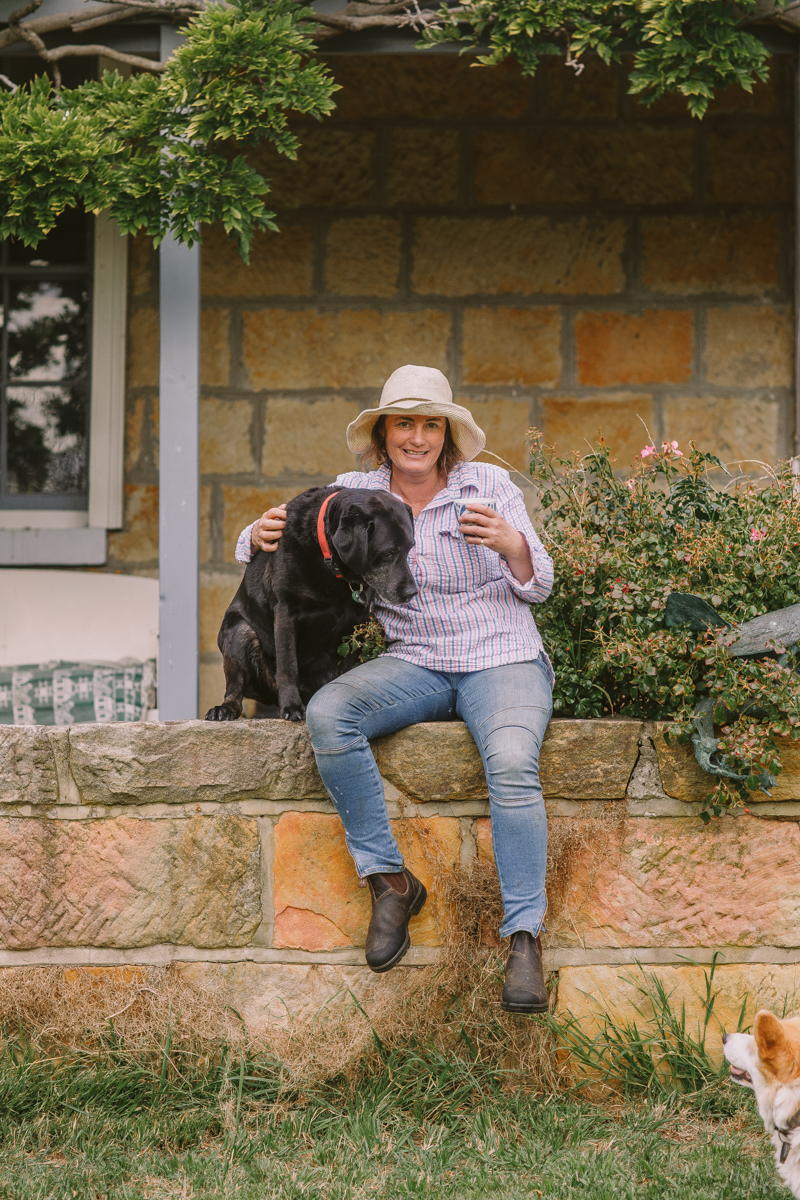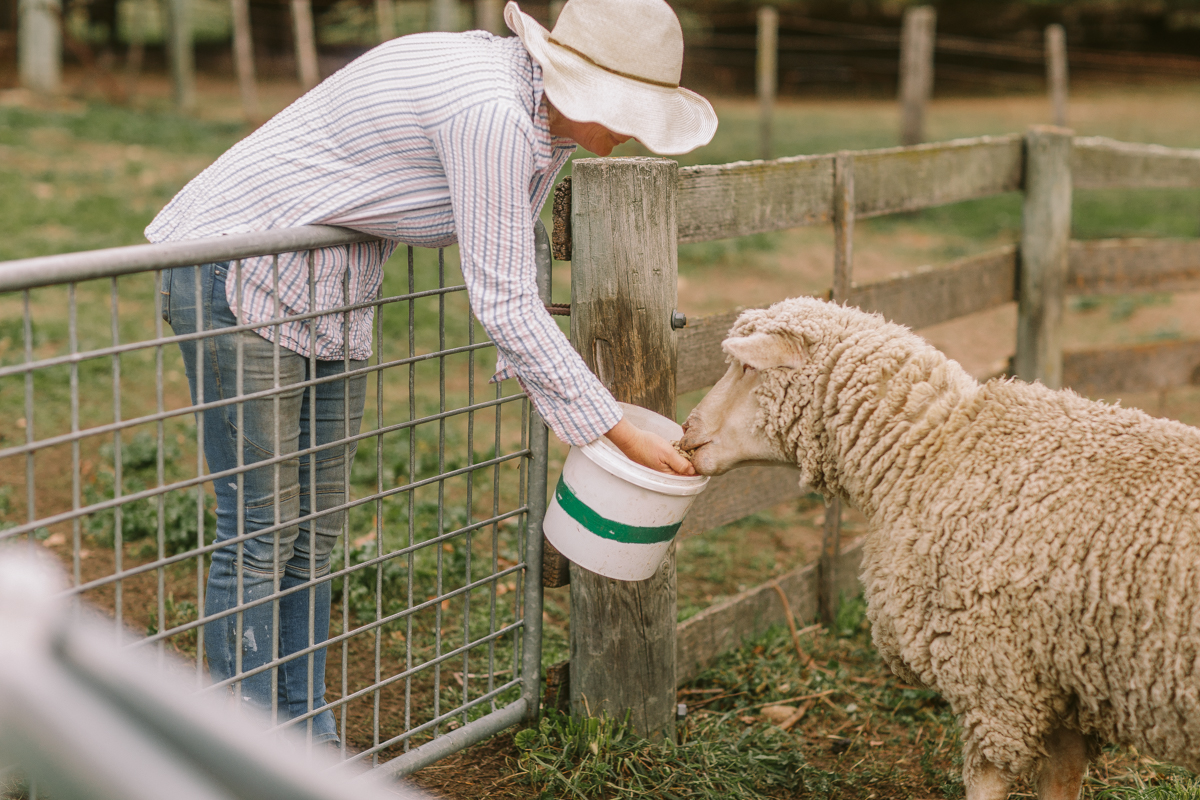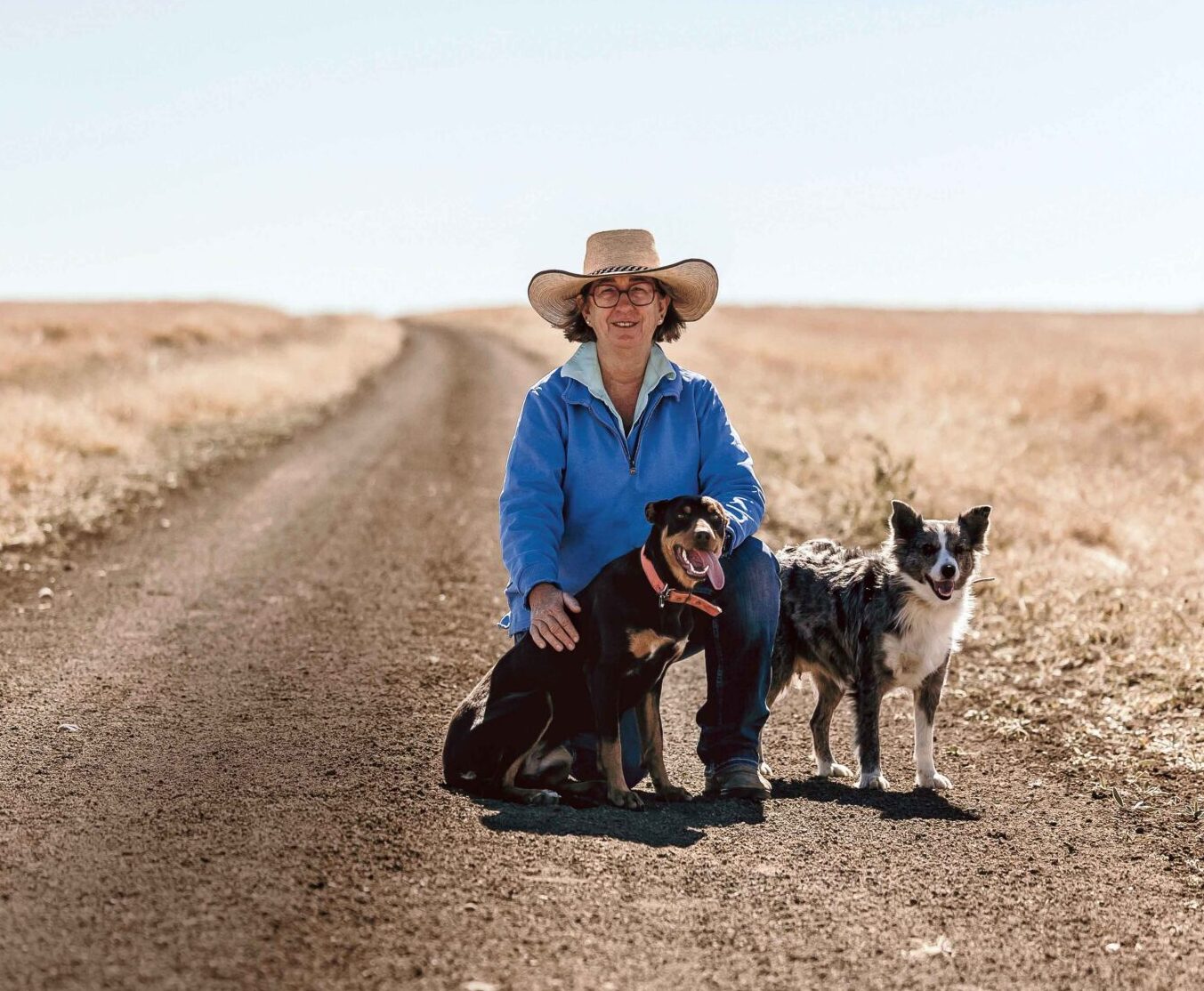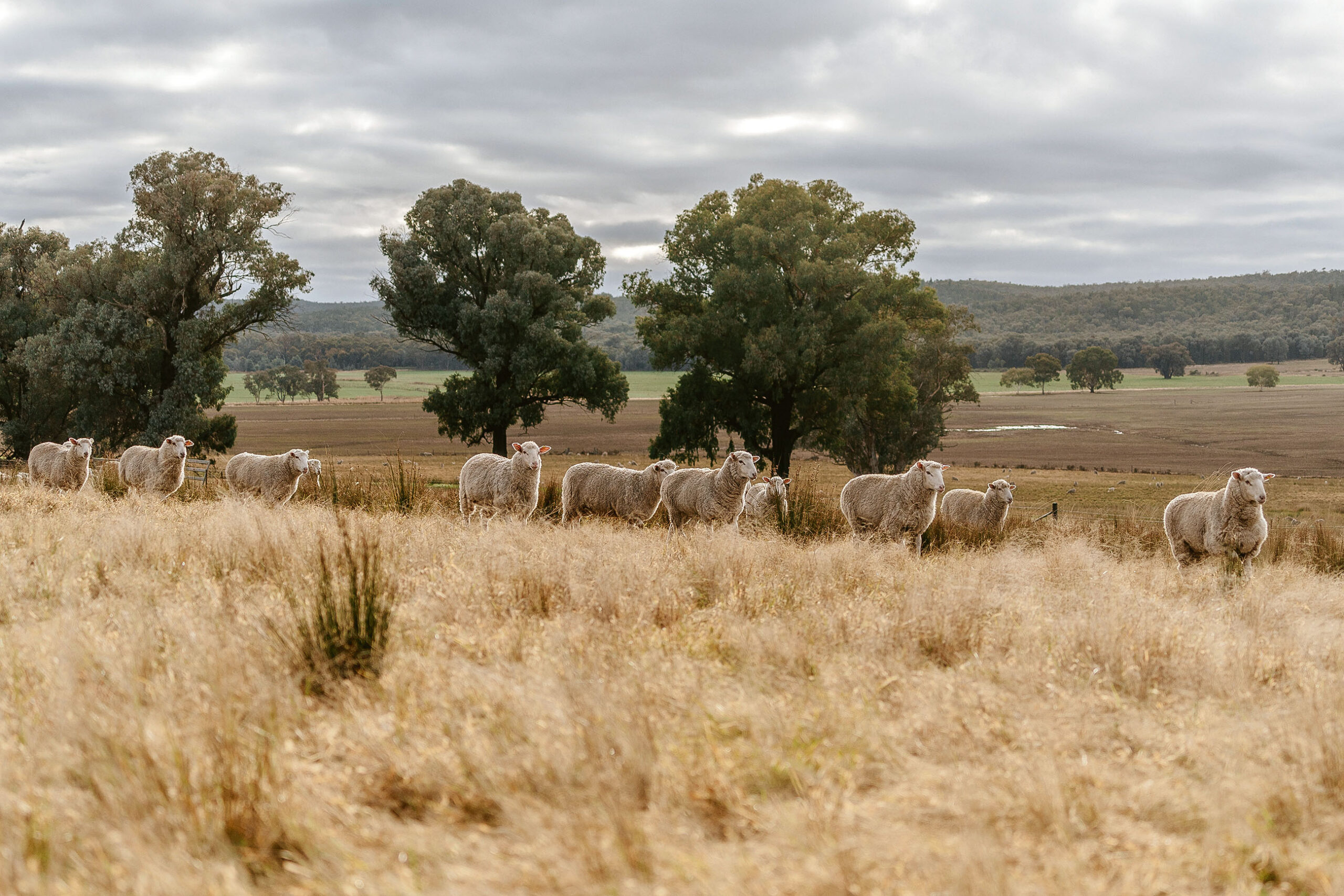Maggie McKellar lives in Tasmania with her partner and two children.
PHOTOGRAPHY FRED AND HANNAH
Sign up to our mailing list for the best stories delivered to your inbox.
In this new column, Maggie MacKellar’s will share extracts from her dairy during lambing season.
WORDS MAGGIE MACKELLAR PHOTOGRAPHY FRED AND HANNAH
It’s still dark outside and I carry a copper pan of glowing coals from the wood heater in the courtyard into my study fire. The coals smoulder and in moments the pine cones and kindling are alight. I sit at my desk, listen to the pop and crack of flames and stare out into predawn darkness. In front of me is a blank page of my journal. I have written something — sometimes only a sentence or a paragraph, other times many pages — most weekday mornings for the past 25 years. During the decade I spent on my own after my husband died I would write in bed, a mug of tea and a slice of toast keeping me company, while my two small children slept their deep predawn sleep. And, if there was no-one to share the burden of getting the kids off to school there was also no-one to grumble about crumbs in the bed or the unearthly hour. Now the kids are grown up and I don’t live on my own, but I still wake early and come into my study to fill the page with what had come the day before, perhaps a drift of conversation that made me smile, or the gossamer filaments of a dream hanging on.
Two years ago, in the middle of the last terrible drought, I decided I would use my morning writing time to record our lambing season. I’d read a book called What the Robin Knows. It’s about learning to understand the world through watching birds and the writer, Jon Young, devotes a whole chapter to the importance of a ‘sit spot’. Being at best an amateur birder, this was not a term I was familiar with, but as soon as I read about it I understood the power of sitting in the same spot day after day, season after season, and learning to really see what is around you. I also realised that a sit spot doesn’t have to be a physical space, it can be a practise of slowing down, of noticing, it can be a blank page in a journal. The diary I kept through the lambing season when there was no feed in the paddocks or water in the creeks and dams, is the heart of my next book. I hope it captures something of our life and work.
Morning
In the courtyard the abandoned lamb I picked up yesterday bleats. Last night I sat on the couch in front of the fire and taught him to suck colostrum from a bottle, small feeds every two hours until I went to bed. He was still alive this morning so I fed him again before rubbing him all over with an old towel. He’s now curled asleep in the lamb pen by the fire, a creature transformed from the limp, cold body I picked up abandoned on the wall of a dam yesterday afternoon.
After breakfast I head out with J on the lambing run. We pass the place where I saw a ewe standing so resolutely over her lamb yesterday. The lamb is still there. It’s dead. I get out to look more closely. Its tail is bitten off. You see them like that, dock-tailed in the paddock; the mothers bite through the soft bone to make them get up. The pain says take a breath, stagger to your feet, find my udder hot and swollen. Live.
This one didn’t.
We drive on, already my jaw is aching and my teeth are clenched. It’s not the dead lamb, it’s the anticipation of what is to come, the fast shutter speed of this life.
Later I’m working in the kitchen and the crackle of the two-way calls me to the courtyard. It’s J, he’s got a potential mother for the lamb who is still in the pen by the fire. I tell him I’ll meet him by the yards. This is what I do. My particular compulsion to play god, interfere, take a small motherless lamb and a lambless mother and join them up.
What’s her story? I ask, as we unload the ewe from the back of the ute. Stuck lamb, he says, a monster, he was dead when I pulled him, but she’s got plenty of milk so I thought she might be a good mum for the lamb.
The ewe staggers on rickety back legs to the furthest corner of the yard. Panic falls off her in sheets. I push her into the narrow race and contain her by the simple method of dropping a 44 gallon drum in front of her and another behind her. She can’t move, her world grows small. Usually a ewe will calm down when she realises two things, that she cannot escape and she’s not going to die. The lamb is following me as I do this. He’s more interested in me than the ewe. But she looks at him, which is promising. I do a bit of forceful bonding, by which I mean I grab the lamb with one hand and with my other I milk the ewe of her first precious drops of colostrum dripping it into the lamb’s mouth. The colostrum is thick and sticky, like condensed milk. After I have given him a taste I push her teat into his mouth. It’s totally undignified, and takes a combination of patience and brute force. I remember the midwives doing the same to my tiny babies. Enormous boob, tiny mouth. Squish.
Some ewes fight this, but this one doesn’t. Some lambs won’t suck, especially if they’ve only ever had a bottle. But this lamb, who I’d had a little trouble getting going on the bottle, is quick to suck from her warm udder.
Evening
A cold front has arrived and I’m wondering if I should bring the lamb in by the fire. If I do, I guarantee he survives the night, but I also disrupt the very tenuous bond he is developing with his foster mum. I pull on an oilskin jacket, beanie, fingerless gloves and head out. Everything is different at night. There’s an edge of wildness that’s not in the yards during the day. A shotgun booms in the far distance. All the unseen things stiffen. Trees are shaken. Possum. The ground is thumped. Kangaroo. A fence wire twangs as bodies shift through the dark. It’s like I radiate a power I don’t want. I’m an intruder pushing into the darkness and the night beings, hidden during the day, feel me and shy away. A mopoke is calling, a sound that takes me instantly back to my childhood. The ground is wet from scudding showers but the night sky is bright and it’s cold enough for a frost. There are no lights here to distract from the stars, and heaven is spread wide.


She’s letting him suck and not butting him away. They’re starting to bond. I turn and walk back towards the house. An owl glides overhead and the night is so bright it casts a shadow. “Good luck,” I whisper.
The ewe is lying down. She scrambles in fright at the beam of torchlight. It’s a good sign she can get up by herself. When I get closer I see the lamb curled up. He’s unconcerned at my approach. I pick him up. He’s warm as toast, the ewe has let him shelter against her hot bulk. His belly feels full.
I was worried about him, but now I feel I’ve interrupted something. I put the lamb back; he makes straight for his new mother’s udder. She stands staring up at me as he butts and rakes his head into her and in moments he is sucking furiously, tail whirling in delight. I leave them and fill a bucket with water from the tap by the gate. When I put it in front of the ewe she rears back. The plastic is foreign, the smell disguises the water, but she has nowhere to go and I press her head toward the water. She resists. I know she’s thirsty. Some ewes will not drink from a bucket. Perhaps the dark helps, this one suddenly relaxes and drinks deeply, draining the bucket. I fill it again and place it in the corner of her tiny space. I decide the lamb will make it. He’s warm. She’s letting him suck and not butting him away. They’re starting to bond. I turn and walk back towards the house. An owl glides overhead and the night is so bright it casts a shadow. “Good luck,” I whisper.

In her youth, she struggled to find her place. Now, Louise Martin knows exactly where she needs to be: in Tambo, Queensland, making sure rural children get the education they deserve.

Writer and photographer Alexandra MacAlpine finds ways to hold onto moments of peace amid the busyness of station life.